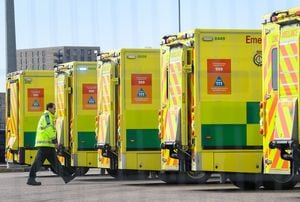Shrewsbury hospital had region’s highest percentage of patients facing long ambulance waits
Shrewsbury’s hospital saw the region’s highest percentage of patients waiting an hour or more to be transferred from an ambulance, a report says.

Out of the 1,505 handovers recorded at the Royal Shrewsbury Hospital (RSH) in December, 237 took longer than 60 minutes.
That rate, of just under 14 per cent, was the highest out of the 16 emergency hospitals covered by the West Midlands Ambulance Service.
The county's hospital bosses say they are seeing a "significant level of urgent care activity".
In a report for the WMAS board, Strategic Operations Director Craig Cooke writes that, region-wide, “hospital handover difficulties started to rise in June, this situation has worsened each month thereafter”, eventually doubling in the last quarter of 2020.
Throughout December, Heartlands Hospital, in Birmingham, had the second-highest rate of hour-plus handovers, at 13.6 per cent, while the Worcestershire Royal Hospital was third with 12.7 per cent. Telford’s Princess Royal Hospital was eighth overall, with 132 out of 1,654, or 6.7 per cent.
However, no patients waited longer than four hours at the RSH. Twenty-nine did so at the Worcestershire Royal, 12 did at Heartlands and three did at the PRH.
In a report Mr Cooke writes that WMAS met all its operational targets in December “despite all the complexities of operational pressures” such “Covid-19, hospital handover delays and seasonal demand”. It was the only English ambulance service to do so.
However, he writes, “hospital handover difficulties started to rise in June, and this situation has worsened each month thereafter”.
Mr Cooke adds: “Quarter three has seen the issues impact significantly, with more patients than ever being delayed in handover to the hospitals.
“The number of patients waiting more than one hour to be handed over has doubled.
“There is a significant increase in the number of patients delayed in handover for longer than one hour and many of these patients wait outside the hospital in an ambulance for a number of hours.
Challenge
“There has been ongoing dialogue between WMAS executive directors and the NHS England / NHS Improvement regional team on this worsening situation, highlighting both the patient risks and operational difficulties this presents.
“The complexity of staff abstractions due to the pandemic continues to be a challenge but normal sickness levels are being maintained and well managed.”
Nigel Lee, chief operating officer at The Shrewsbury and Telford Hospital NHS Trust (SaTH), said: “Our hospitals are seeing a significant level of urgent care activity, both in terms of the number of patients with Covid-19 that we are treating and the number of emergency patients more generally we are seeing at our A&Es.
“Patients arriving by ambulance, whose admission is delayed, are assessed by a senior member of the medical staff.
“If you need urgent care, then make sure you think 111 first. NHS 111 will be able to assess you and, if you should need it, book you at time slot at a range of services in the hospitals and the community including A&E to make sure you can be seen safely.
“In an emergency, please call 999.”
The West Midlands Ambulance Service University NHS Foundation Trust board of directors will discuss Mr Cooke’s report tomorrow.





